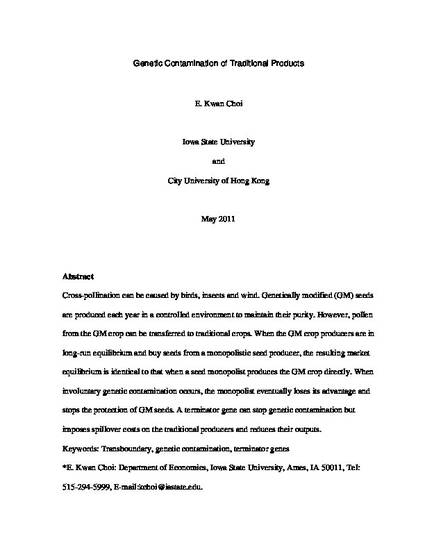
Article
Genetic contamination of traditional products
International Review of Economics and Finance
Document Type
Article
Publication Version
Submitted Manuscript
Publication Date
1-1-2013
DOI
10.1016/j.iref.2012.10.006
Abstract
Cross-pollination can be caused by birds, insects and wind. Genetically modified (GM) seeds are produced each year in a controlled environment to maintain their purity. However, pollen from the GM crop can be transferred to traditional crops. When the GM crop producers are in long-run equilibrium and buy seeds from a monopolistic seed producer, the resulting market equilibrium is identical to that when a seed monopolist produces the GM crop directly. When involuntary genetic contamination occurs, the monopolist eventually loses its advantage and stops its protection of GM seeds. A terminator gene can stop genetic contamination but imposes spillover costs on the traditional producers and reduces their outputs.
Copyright Owner
Elsevier Inc.
Copyright Date
2013
Language
en
File Format
application/pdf
Citation Information
E. Kwan Choi. "Genetic contamination of traditional products" International Review of Economics and Finance Vol. 27 (2013) p. 291 - 297 Available at: http://works.bepress.com/ekwan-choi/20/

NOTICE: this is the author’s version of a work that was accepted for publication in International Review of Economics and Finance. Changes resulting from the publishing process, such as peer review, editing, corrections, structural formatting, and other quality control mechanisms may not be reflected in this document. Changes may have been made to this work since it was submitted for publication. A definitive version was subsequently published in International Review of Economics and Finance 27 (2013), doi: 10.1016/j.iref.2012.10.006.